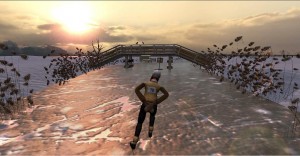Given current demographic developments, the number of elderly and will increase rapidly in the coming years. Falls are amongst the most frequent reasons for medical intervention in the elderly and are a major threat to their health and independence and medical costs are high and rising. Thirty-two percent of community dwelling persons 75 years and older, fell at least once a year. Primary causes of falling are postural instabilities during daily activities. Developing a tool to train the balance is therefore of great importance for the elderly. Serious gaming or exergaming, that is playing a video game that requires actual body movements for game play, offers new, exciting possibilities.
If properly designed for a target group these games can be both challenging and effective and fun to play at home, whether alone, or with other internet-users. Exergaming contains a number of specific aspects that bring added value over conventional balance training. . When exercising by playing a balance game people do not pay attention to the physical exercise and their own movements but on the outcome of their movements in the projected environment. This external focus of attention enhances learning and might result in greater automaticity of postural control. Exercises can be easily adapted to the level of performance of the person. Specific activities can be practiced under different circumstances to train different motor and cognitive responses. By monitoring improvement or deterioration of postural control fall risk can be evaluated and coupled with telemonitoring services (such as for example, physical therapy, rehabilitation). Research also shows that older people are especially interested in new technology, but not be clear added value at any price, and the purpose of the games must be clear
Project Aim:
The aim of the project is the development of a training device for training balance of seniors at home including serious gaming modules and remote monitoring system, ready for transfer to industry.
Specific goals:
- Description of user requirements and needs for exergaming and telemonitoring systems.
- The development of standardized data acquisition and analysis methods that contributes to further development of games, visualizing effects for developers and users, and feedback modules.
- Telemonitoring System: Market Ripe (basic version); Expandable by third parties.
- Development of new games and services on the basis of the system.
Based on the objective five work packages are described:
- WP1: Development of serious gaming for balance training (software)
Coordinator: A. (Albert) Sikkema. More... - WP2: Sensor technology, data acquisition and algorithm development
Coordinator: J (Jan) Stegenga. More... - WP3: User requirements, observation, analysis, validation.
Coordinator: CJC (Claudine) Lamoth. More… - WP4: Telemonitoring development and potential services
Coordinator: J.C.(Hans) Wortman. More... - WP5: Business Case; valorisation transfer to industry
Coordinator: R.P.M. (Ruud) van de Bilt. More…




